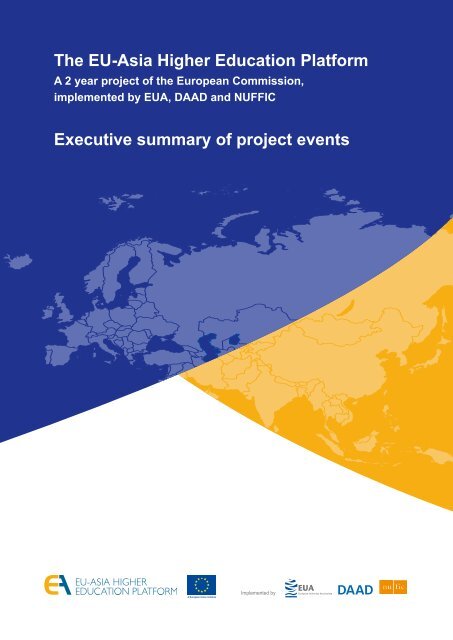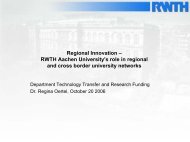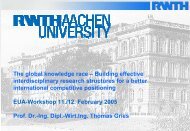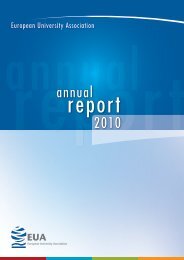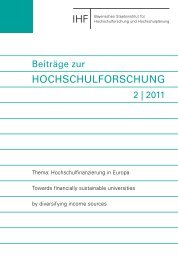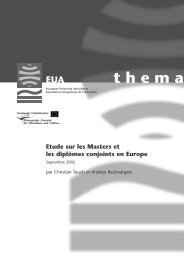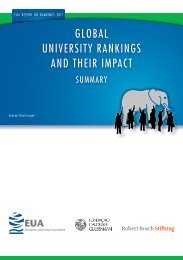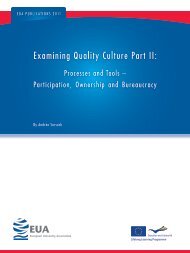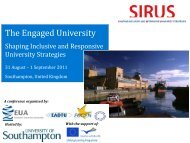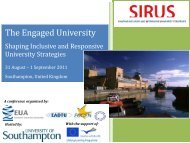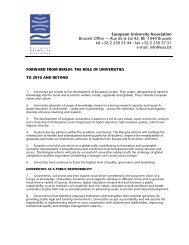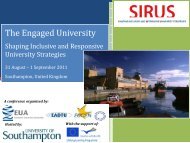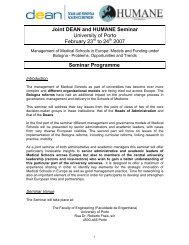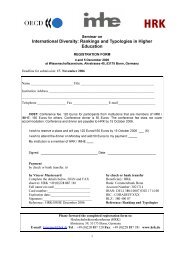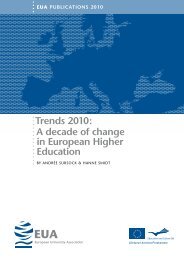The EU-Asia Higher Education Platform Executive summary of ...
The EU-Asia Higher Education Platform Executive summary of ...
The EU-Asia Higher Education Platform Executive summary of ...
Create successful ePaper yourself
Turn your PDF publications into a flip-book with our unique Google optimized e-Paper software.
<strong>The</strong> <strong>EU</strong>-<strong>Asia</strong> <strong>Higher</strong> <strong>Education</strong> <strong>Platform</strong><br />
A 2 year project <strong>of</strong> the European Commission,<br />
implemented by <strong>EU</strong>A, DAAD and NUFFIC<br />
<strong>Executive</strong> <strong>summary</strong> <strong>of</strong> project events<br />
A European Union Initiative<br />
Implemented by
Table <strong>of</strong> contents<br />
Project and Objectives 2<br />
Round Table 1: Autonomy, Governance and Management in <strong>Higher</strong> <strong>Education</strong> in <strong>Asia</strong> and Europe 3<br />
Round table 2: Regional higher education cooperation in the next decade:<br />
<strong>The</strong> Bologna process and Europe-<strong>Asia</strong> dialogue 5<br />
Workshop 1: Doctoral and Graduate <strong>Education</strong> in <strong>Asia</strong> and Europe 6<br />
Workshop 2: Student Mobility, Joint Degrees and Institutional Development 7<br />
Workshop 3: International Partnerships in <strong>Higher</strong> <strong>Education</strong>: Policies, Practices and Lessons Learned 8<br />
Workshop 4: Quality Assurance in <strong>Asia</strong>n and European <strong>Higher</strong> <strong>Education</strong> – Opportunities for Inter- and Intra-<br />
Regional Cooperation 9<br />
<strong>EU</strong>-India <strong>Higher</strong> <strong>Education</strong> Symposium: Boosting social and economic development for a<br />
better tomorrow 10<br />
Symposium on Thailand-<strong>EU</strong> cooperation in <strong>Higher</strong> <strong>Education</strong>: Common interests and<br />
shared commitments 11<br />
<strong>EU</strong>-<strong>Asia</strong> <strong>Higher</strong> <strong>Education</strong> Fairs (EHEF) 12<br />
Snapshot EHEF New Delhi, India 13<br />
Snapshot EHEF Bangkok, Thailand 13<br />
1
2<br />
EAHEP (<strong>EU</strong>-<strong>Asia</strong> <strong>Higher</strong> <strong>Education</strong> <strong>Platform</strong>) was<br />
an initiative <strong>of</strong> the European Commission to promote<br />
cooperation in higher education between <strong>Asia</strong>n and<br />
European countries under the <strong>Asia</strong>-Link Programme,<br />
to complement the partnership projects that have<br />
been facilitated since 2002 <strong>The</strong> initiative was jointly<br />
implemented by the European University Association<br />
(<strong>EU</strong>A), the German Academic Exchange Service<br />
(DAAD), and the Netherlands Organisation for<br />
International Cooperation in <strong>Higher</strong> <strong>Education</strong><br />
(Nuffic) in 2008 and 2009 <strong>The</strong> project specifically<br />
aimed to:<br />
• provide a sustainable forum (on the internet and<br />
through meetings) for disseminating project results,<br />
lessons learned, and good practice gained under<br />
<strong>Asia</strong>-Link and similar vehicles for <strong>EU</strong> <strong>Asia</strong>-higher<br />
education cooperation<br />
• provide information on (a) the practical issues <strong>of</strong> higher<br />
education cooperation, (b) the common challenges<br />
faced by higher education administrators/ policymakers<br />
in Europe and <strong>Asia</strong>, and (c) the role higher<br />
education cooperation can play in development,<br />
particularly in least-developed countries in <strong>Asia</strong><br />
• assist <strong>EU</strong> and <strong>Asia</strong>n higher education institutions and<br />
organisations in preparing for increased student and<br />
academic mobility between the two regions, and/or<br />
between <strong>Asia</strong>n countries<br />
<strong>Asia</strong>n countries eligible for EAHEP funding were<br />
Afghanistan, Bangladesh, Bhutan, Cambodia, China,<br />
India, Indonesia, Laos, the Maldives, Malaysia,<br />
Mongolia, Myanmar, Nepal, North Korea, Pakistan,<br />
Philippines, Sri Lanka, Thailand and Vietnam Brunei,<br />
Taipei, Hong Kong, Japan, Macau, Singapore, South<br />
Korea could be associated to EAHEP activities but were<br />
not directly eligible for funding<br />
Eligible countries in Europe were Austria, Belgium,<br />
Bulgaria, Croatia, Cyprus, the Czech Republic, Denmark,<br />
Estonia, Finland, France, FYROM, Germany, Greece,<br />
Hungary, Iceland, Ireland, Italy, Latvia, Liechtenstein,<br />
Lithuania, Luxembourg, Malta, Netherlands, Norway,<br />
Poland, Portugal, Romania, Slovakia, Slovenia, Spain,<br />
Sweden, Turkey and the United Kingdom<br />
Project and Objectives<br />
<strong>The</strong> project addressed the university community, higher<br />
education organisations and government agencies and<br />
consisted <strong>of</strong> a series <strong>of</strong> events organised mainly in <strong>Asia</strong>:<br />
• European <strong>Higher</strong> <strong>Education</strong> fairs and symposia in New<br />
Delhi November 2008 and in Bangkok, November<br />
2009<br />
• A round table on Autonomy, Governance and<br />
Management in <strong>Higher</strong> <strong>Education</strong> in <strong>Asia</strong> and Europe<br />
25-26 November 2008, Hanoi, Vietnam<br />
• A round table on Regional higher education<br />
cooperation in the next decade: <strong>The</strong> Bologna process<br />
and Europe-<strong>Asia</strong> dialogue, 1-4 July 2009, Brussels,<br />
Belgium<br />
• A workshop on Doctoral and Graduate <strong>Education</strong> in<br />
<strong>Asia</strong> and Europe, 8-9 December 2008, Beijing, China<br />
• A workshop on Student Mobility, Joint Degrees and<br />
Institutional Development, 16-17 February 2009,<br />
Kuala Lumpur, Malaysia<br />
• A workshop on International Partnerships in <strong>Higher</strong><br />
<strong>Education</strong>: Policies, Practices and Lessons Learned,<br />
8-9 June 2009, Jakarta, Indonesia<br />
• A workshop on Quality Assurance in <strong>Asia</strong>n and<br />
European <strong>Higher</strong> <strong>Education</strong> – Opportunities for Inter-<br />
and Intra-Regional Cooperation, 27-29 October 2009,<br />
Bangkok, Thailand<br />
Attendance at workshops and round tables was by<br />
invitation only, however results, <strong>summary</strong> reports and<br />
follow-up topics are publicly available on the EAHEP<br />
website<br />
<strong>The</strong> website also provides information on higher<br />
education systems in Europe and <strong>Asia</strong>, study and<br />
research opportunities, cooperation projects and<br />
initiatives, and funding schemes; www eahep org<br />
<strong>The</strong> current publication is a <strong>summary</strong> <strong>of</strong> these events<br />
and their outcomes
Round Table 1: Autonomy, Governance and Management<br />
in <strong>Higher</strong> <strong>Education</strong> in <strong>Asia</strong> and Europe<br />
25-26 November 2008, Hanoi, Vietnam<br />
Objective:<br />
This round table constituted the first high-level policy<br />
dialogue meeting between <strong>Asia</strong>n and <strong>EU</strong> university<br />
leaders and senior experts under the EAHEP It was<br />
designed to exchange information on the status quo<br />
<strong>of</strong> <strong>Asia</strong>n and European higher education systems,<br />
particularly focusing on autonomy, governance and<br />
management <strong>of</strong> higher education institutions <strong>The</strong> round<br />
table presented good practice examples <strong>of</strong> university<br />
governance and management, thereby promoting<br />
university autonomy and good governance <strong>of</strong> higher<br />
education institutions in both regions It furthermore<br />
highlighted the importance <strong>of</strong> capacity building in higher<br />
education management and presented opportunities for<br />
cooperation in the field<br />
Programme design:<br />
<strong>The</strong> round table was held as a two-day event,<br />
preceded by a half-day pre-round table programme<br />
at Hanoi University <strong>of</strong> Technology, which introduced<br />
the international participants to the Vietnamese higher<br />
education system <strong>The</strong> round table itself was opened by<br />
three keynote presentations on recent trends and future<br />
perspectives <strong>of</strong> university autonomy and governance in<br />
<strong>Asia</strong> and Europe <strong>The</strong> presentations were followed up in<br />
six working groups, focusing on specific subtopics, such<br />
as entrepreneurial universities, balancing institutional<br />
centralisation and decentralisation and capacity<br />
building in university management <strong>The</strong> round table was<br />
concluded with a panel discussion on various higher<br />
education cooperation initiatives between <strong>Asia</strong> and<br />
Europe<br />
Participation:<br />
<strong>The</strong> event targeted senior leadership and key faculty<br />
from <strong>Asia</strong>n and European universities as well as higher<br />
education experts and project representatives from<br />
both regions Roughly 90 representatives <strong>of</strong> <strong>Asia</strong>n<br />
and European institutions participated in the event,<br />
particularly senior-level university representatives with<br />
experience in higher education management As to be<br />
expected from an event taking place in Hanoi, Vietnam,<br />
around two-thirds <strong>of</strong> the participants came from <strong>Asia</strong>,<br />
particularly from Vietnam, and around one-third from<br />
Europe<br />
<strong>The</strong> pre-round table session and the round table were<br />
<strong>of</strong>ficially opened by Ambassador Doyle, Head <strong>of</strong> the<br />
Delegation <strong>of</strong> the European Commission in Vietnam <strong>The</strong><br />
opening <strong>of</strong> the round table was furthermore honoured<br />
by the presence <strong>of</strong> Vice-Minister Pham Vu Luan <strong>of</strong> the<br />
Vietnamese Ministry <strong>of</strong> <strong>Education</strong> and Training (MOET)<br />
Outcomes:<br />
<strong>The</strong> European and <strong>Asia</strong>n countries represented at the<br />
round table had similar broad approaches to autonomy,<br />
3
4<br />
governance and management National policies were<br />
at different stages, but moving in the same direction –<br />
towards more, if not complete, autonomy, and towards<br />
accountability provided through effective governing<br />
bodies with external representatives, and more<br />
corporate management Compared to some 4-5 years<br />
ago, the discussion on the topic has matured in that<br />
many European and <strong>Asia</strong>n countries have introduced<br />
autonomy and universities have gathered hands-on<br />
experience in new forms <strong>of</strong> governance, management<br />
and related issues <strong>The</strong>refore, the concern that<br />
autonomy would result in the privatisation <strong>of</strong> higher<br />
education came only from university representatives<br />
from countries where autonomy has not yet or<br />
only recently been introduced However, there was<br />
widespread concern that governance reforms could be<br />
used as an opportunity to decrease public funding, and<br />
that the new accountability requirements would make<br />
autonomy obsolete<br />
Three other themes were highlighted during the round<br />
table: (1) the need for flexibility for universities to raise<br />
their own resources, (2) the importance <strong>of</strong> diversity in<br />
what the universities <strong>of</strong>fer, and (3) the value as well<br />
as the challenges created by internationally mobile<br />
students<br />
Round table participants clearly emphasised the<br />
importance <strong>of</strong> maintaining dialogue platforms alongside<br />
existing mobility schemes in order to intensify further<br />
<strong>EU</strong>-<strong>Asia</strong> higher education cooperation, and the need<br />
to engage into cross-border exchange and cooperation<br />
on the topic It has to be stressed that capacity building<br />
and cross-border exchange on governance are not<br />
only relevant to developing countries, but principally<br />
to all countries where autonomy has been introduced<br />
rather recently and/ or the higher education system has<br />
expanded at a rapid pace
Round table 2: Regional higher education cooperation in the next decade:<br />
<strong>The</strong> Bologna process and Europe-<strong>Asia</strong> dialogue<br />
1-4 July 2009, Brussels, Belgium<br />
Objective:<br />
This round table took the Bologna process and the recent<br />
Bologna Ministerial Meeting in Leuven/Louvain as point <strong>of</strong><br />
departure, and compared the European reform process<br />
to developments in <strong>Asia</strong>, and their impact on cooperation<br />
It addressed a variety <strong>of</strong> issues <strong>of</strong> immediate relevance<br />
to higher education institutions in both regions such as<br />
quality assurance, degree structures and recognition,<br />
research cooperation, and also the role <strong>of</strong> universities and<br />
university organisations in national and regional reform<br />
processes In this regard, it also sought to contribute to<br />
the formulation <strong>of</strong> policy recommendations related to the<br />
<strong>Asia</strong>-Europe Meeting (ASEM) education process<br />
Participation:<br />
<strong>The</strong> round table brought together 112 <strong>Asia</strong>n and European<br />
university leaders and practitioners, and representatives<br />
<strong>of</strong> higher education organisations and government<br />
agencies for an interactive discussion on European and<br />
<strong>Asia</strong>n higher education reform developments Organised<br />
within the European Commission, it was a good<br />
opportunity for both EC <strong>of</strong>ficials and higher education<br />
organisations in Brussels to take part<br />
Programme design:<br />
<strong>The</strong> main two-day event, 2-3 July, was divided into five<br />
plenaries and one break-out session; the latter included<br />
three specialist break-out discussions on (1) Recognition<br />
and mobility: from intra-regional to inter-regional; (2)<br />
New frontiers in quality assurance: bridging national<br />
and regional frameworks; and (3) Degree structures and<br />
qualifications frameworks <strong>The</strong> first day’s programme<br />
focused on ‘Lessons from the Bologna process and<br />
regional reform processes’ and the second day’s overall<br />
theme was ‘Strategic priorities for higher education<br />
development and cooperation’ A pre-conference<br />
programme on 1 July included a European Commission<br />
information session on the European Union’s <strong>EU</strong> external<br />
relations toward <strong>Asia</strong>, and funding opportunities for higher<br />
education and research cooperation<br />
Outcomes:<br />
<strong>The</strong> round table demonstrated that there is a general<br />
interest in facilitating further information exchange on policy<br />
processes at regional level, and on developing specific<br />
activities and instruments <strong>The</strong> speakers demonstrated<br />
the complexity <strong>of</strong> the regional reform initiatives, and that<br />
specific Bologna reforms are not simply transferable to the<br />
<strong>Asia</strong>n region It is therefore important to examine the actual<br />
needs and realities <strong>of</strong> universities and university systems,<br />
and the existing and potential structure and bodies that<br />
facilitate regional cooperation and cohesion As a result,<br />
the round table was not only perceived as an event under<br />
the <strong>EU</strong>-<strong>Asia</strong> <strong>Higher</strong> <strong>Education</strong> <strong>Platform</strong>, but a contribution<br />
to the ASEM <strong>Education</strong> Process, initiated in 2008<br />
5
6<br />
Workshop 1: Doctoral and Graduate <strong>Education</strong> in <strong>Asia</strong> and Europe<br />
8-9 December 2008, Beijing, China<br />
Objective<br />
In many universities and higher education systems,<br />
doctoral education is currently being rethought<br />
and redesigned in response to changing demands<br />
from academics and within research, and society<br />
It is increasingly perceived as a strategic means for<br />
institutional internationalisation, as it contributes to<br />
pooling academic talent and to building strategic links<br />
with partners around the globe While the overhaul <strong>of</strong> the<br />
doctorate cycle and its role in institutional cooperation<br />
and exchange are themes that are being explored at<br />
the institutional, national and even regional level (as is<br />
the case in Europe at present), this workshop provided<br />
the first occasion for university representatives to meet<br />
and exchange at an interregional Europe-<strong>Asia</strong> level on<br />
the topic<br />
Participation<br />
45 leaders from European and <strong>Asia</strong>n graduate/doctoral<br />
schools and programmes participated in the workshop<br />
Many <strong>of</strong> the European participants were members <strong>of</strong> the<br />
newly established <strong>EU</strong>A Council for Doctoral <strong>Education</strong>,<br />
which advised and supported the initiative A postprogramme<br />
meeting on Europe-China cooperation<br />
concluded the event, drawing over 40 representatives <strong>of</strong><br />
Chinese universities in primarily the Beijing area<br />
Programme design<br />
<strong>The</strong> event was held at the European Commission<br />
Delegation to China and Mongolia Plenary and<br />
interactive breakout sessions dealt with issues such as:<br />
• new delivery modes <strong>of</strong> doctoral programmes, including<br />
joint degrees and distance learning<br />
• relationship between Masters and Doctorates<br />
• employability <strong>of</strong> doctorate holders<br />
• current trends in doctoral education in Europe and<br />
<strong>Asia</strong><br />
• enhanced cooperation in doctoral education between<br />
<strong>Asia</strong> and Europe<br />
• development <strong>of</strong> good practices with regards to<br />
capacity building in doctoral education<br />
Outcomes<br />
Regardless <strong>of</strong> the diversity <strong>of</strong> institutional, national and<br />
socio-economic backgrounds, there was a high-level <strong>of</strong><br />
agreement on general principles for doctoral education,<br />
for example, the need to emphasise skills training, not<br />
only with regards to enhancing employability in the<br />
labour market, but also to the overall role <strong>of</strong> research<br />
and research training in knowledge societies and<br />
economies<br />
While there seems to be a general trend towards<br />
graduate or doctorate schools, major differences occur<br />
in the concept, whether they appear to be mono- or<br />
multi-disciplinary focused, or established mainly as an<br />
administrative structure <strong>The</strong> issue <strong>of</strong> capacity building<br />
for universities in emerging countries should be explored<br />
in more detail at upcoming occasions Quality assurance<br />
in doctoral education was highlighted in all sessions as<br />
a requirement, but also as an achievement <strong>of</strong> structural<br />
reform Participants agreed on the need to enhance<br />
transparency in doctoral education, and a database <strong>of</strong><br />
institutions and programmes has been suggested as<br />
one way to achieve this It was acknowledged that the<br />
total funding that the <strong>EU</strong> provides for higher education<br />
and research cooperation between <strong>Asia</strong> and Europe<br />
has increased However, in view <strong>of</strong> the current trend<br />
<strong>of</strong> large and strictly structured funding programmes,<br />
there are insufficient funding opportunities for novel and<br />
innovative approaches
Workshop 2: Student Mobility, Joint Degrees and Institutional Development<br />
16-17 February 2009, Kuala Lumpur, Malaysia<br />
Objective:<br />
While the problems <strong>of</strong> realising student mobility and<br />
exchanges are now widely addressed, less attention<br />
has been paid to the subsequent benefits mobility<br />
may bring: improving the quality <strong>of</strong> education and<br />
research and strengthening the capacity <strong>of</strong> institutions<br />
to internationalise their programmes and services This<br />
workshop explored the opportunities for improving<br />
academic quality through international collaboration in<br />
curriculum development and student mobility It focused<br />
on the advantages and disadvantages <strong>of</strong> linking mobility<br />
to joint and double degrees, as compared to other forms<br />
<strong>of</strong> academic cooperation and mobility More specifically,<br />
it looked at these opportunities in programmes and<br />
projects in which both European and <strong>Asia</strong>n institutes<br />
participate<br />
Participation:<br />
<strong>The</strong> event targeted university staff members,<br />
administrators, government <strong>of</strong>ficials and development<br />
partners closely involved in the promotion and<br />
implementation <strong>of</strong> international cooperation in higher<br />
education through student mobility and joint/double<br />
degree programmes <strong>The</strong> 47 participants came from<br />
seven European and eight <strong>Asia</strong>n countries, and most<br />
<strong>of</strong> them had experience with <strong>Asia</strong>-Link and Erasmus<br />
Mundus projects<br />
Programme design:<br />
Invited speakers gave introductions on concepts,<br />
perspectives and experiences, followed by discussions<br />
in interactive breakout sessions <strong>The</strong> sessions brought<br />
together the views <strong>of</strong> European and <strong>Asia</strong>n participants on<br />
ambitions, opportunities and challenges on the subject<br />
With the help <strong>of</strong> moderators, mixed groups composed <strong>of</strong><br />
European and <strong>Asia</strong>n participants discussed:<br />
• considerations and conditions which influence<br />
decisions for linking student mobility to joint or double<br />
degree programmes, or to other forms <strong>of</strong> academic<br />
collaboration and mobility<br />
• organisation and management <strong>of</strong> sustainable<br />
collaborations in setting up joint master degree<br />
programmes<br />
• institutional benefits (e g in terms <strong>of</strong> curriculum and overall<br />
internationalisation) resulting from the establishment <strong>of</strong><br />
such programmes and academic cooperation<br />
Outcomes:<br />
Academic cooperation through student mobility and joint/<br />
double degree programmes were in general considered<br />
as positive Student mobility seems to be most<br />
effective when linked to existing academic cooperation<br />
programmes between institutions Seemingly, mobile<br />
students benefit the most from these programmes, as<br />
studying abroad can improve their employability <strong>The</strong><br />
benefits for the institutions are less clear<br />
Variations in the types <strong>of</strong> quality systems used within<br />
<strong>Asia</strong>, makes it difficult to agree on one joint system for<br />
quality standards and quality approach<br />
<strong>The</strong> curriculum <strong>of</strong> a joint degree programme should<br />
be newly developed, combining the strengths <strong>of</strong> the<br />
collaborating partners However, practice shows that<br />
agreeing on the content <strong>of</strong> the curriculum is a complex<br />
and time consuming process<br />
<strong>The</strong> workshop clarified that in general, the experience<br />
with joint degrees and double degrees has been fraught<br />
with legal peril in <strong>Asia</strong>n universities <strong>The</strong> participants<br />
admitted that the benefits <strong>of</strong> the programmes are not<br />
seen immediately, but they expect that academic<br />
standards <strong>of</strong> the institution will rise<br />
7
8<br />
Workshop 3: International Partnerships in <strong>Higher</strong> <strong>Education</strong>:<br />
Policies, Practices and Lessons Learned<br />
8-9 June 2009, Jakarta, Indonesia<br />
Objective:<br />
Universities are increasingly looking for international<br />
partners for a variety <strong>of</strong> strategic or opportunistic<br />
reasons This workshop explored the added value<br />
<strong>of</strong> international partnerships in higher education for<br />
achieving academic and institutional goals It focused<br />
on conditions which influence decisions on establishing<br />
international academic partnerships with institutions<br />
abroad and the practical challenges involved in initiating<br />
and maintaining sustainable successful partnerships<br />
Furthermore, it analyzed the myriad institutional benefits<br />
that may result from such partnerships<br />
Participation:<br />
<strong>The</strong> event targeted university staff members, administrators,<br />
government <strong>of</strong>ficials and development partners closely<br />
involved in initiating and maintaining academic partnerships<br />
<strong>The</strong> 37 participants came from seven European and eight<br />
<strong>Asia</strong>n countries, and most <strong>of</strong> them had experience in<br />
<strong>Asia</strong>- Link and Erasmus Mundus projects<br />
Programme design:<br />
Experiences with partnerships in programmes and<br />
projects, in which European and <strong>Asia</strong>n institutes<br />
participate, formed the basis for the discussions<br />
Introductions on concepts, perspectives and experiences<br />
by invited speakers were followed by discussions in<br />
interactive breakout sessions<br />
Outcomes:<br />
Activities carried out in the framework <strong>of</strong> the partnerships<br />
are mainly focused on cooperation in education and<br />
research, mobility <strong>of</strong> students and staff, and other activities<br />
facilitating international knowledge sharing In order to<br />
establish a shared vision, goals and policy, thorough<br />
knowledge <strong>of</strong> the partner and <strong>of</strong> their expertise, ambitions<br />
and expectations is necessary, as well as transparency<br />
around the financial set-up <strong>of</strong> the partnership<br />
To make partnerships sustainable there should be:<br />
• an active and continuous search for compatibility<br />
• long term commitment which is institutionalised at all<br />
levels <strong>of</strong> both institutions, and compatible with and<br />
embedded in both institutions’ policy plans<br />
• strong leadership and project management<br />
• an active monitoring <strong>of</strong> the quality <strong>of</strong> all aspects <strong>of</strong> the<br />
partnership<br />
Governments and donors were advised to have reliable<br />
and continuous policies and provide sufficient and<br />
constant financial means for higher education <strong>The</strong>y<br />
should support international academic partnerships<br />
financially, but also practically (e g minimising<br />
bureaucratic burden, facilitating visa, licences and credit<br />
transfer), creating a context that allows partnerships to<br />
flourish
Workshop 4: Quality Assurance in <strong>Asia</strong>n and European <strong>Higher</strong> <strong>Education</strong>:<br />
Opportunities for Inter- and Intra-Regional Cooperation<br />
27-29 October 2009, Bangkok, Thailand<br />
Objective:<br />
<strong>The</strong> fourth workshop focused on internal and external<br />
quality assurance procedures in higher education,<br />
particularly on regional cooperation initiatives in the<br />
field It was designed as a platform for information<br />
exchange on goals, strategies and working methods <strong>of</strong><br />
regional quality assurance networks in <strong>Asia</strong> and Europe<br />
<strong>The</strong> workshop was intended to identify common aims,<br />
build trust among regional quality assurance networks,<br />
and promote cooperation between <strong>Asia</strong>n and European<br />
quality assurance networks<br />
Participation:<br />
<strong>The</strong> workshop was conducted in close cooperation with<br />
the ASEAN University Network (AUN) and hosted by<br />
Chulalongkorn University in Bangkok, one <strong>of</strong> the leading<br />
<strong>Asia</strong>n universities Roughly 40 university representatives<br />
and quality assurance experts from <strong>Asia</strong> and Europe<br />
participated in the workshop<br />
Programme design:<br />
Prior to the workshop participants were invited to visit<br />
Chulalongkorn University and meet with key staff in<br />
the field <strong>of</strong> quality assurance <strong>The</strong> two-day workshop<br />
was opened by five keynote presentations, focusing<br />
on recent trends and future perspectives on quality<br />
assurance in higher education in <strong>Asia</strong> and Europe, both<br />
from a governmental and an institutional perspective<br />
<strong>The</strong> keynote presentations were followed up in six<br />
parallel working group sessions, focusing on sub-topics,<br />
such as capacity building in quality assurance, regional<br />
benchmarking initiatives and quality assurance in joint<br />
degree programmes <strong>The</strong> workshop was concluded<br />
with a panel discussion on cooperation opportunities for<br />
quality assurance in higher education<br />
Outcomes:<br />
Growing student numbers, the ensuing transition from<br />
elite to mass higher education, increasingly diversified<br />
institutional missions and the introduction <strong>of</strong> new<br />
forms <strong>of</strong> learning are challenges for higher education<br />
institutions in both <strong>Asia</strong> and Europe Furthermore, many<br />
countries, especially in <strong>Asia</strong>, show a mushrooming <strong>of</strong><br />
private institutions Quality assurance systems in higher<br />
education have to rise to these challenges Internal<br />
quality assurance and external quality assurance were<br />
perceived as two sides <strong>of</strong> the same coin, and there was<br />
a general understanding that the main responsibility for<br />
assuring and enhancing institutional quality should be<br />
with the universities Regional harmonisation processes<br />
with regard to quality assurance in higher education have<br />
started to develop in Europe and <strong>Asia</strong> In both regions,<br />
there are attempts to enhance the understanding and<br />
mutual recognition <strong>of</strong> quality assurance decisions Future<br />
cooperation initiatives should focus on various aspects<br />
<strong>of</strong> quality assurance, such as information exchange,<br />
the training <strong>of</strong> experts and the exchange <strong>of</strong> peers, and<br />
discussion on common principles in designing different<br />
internal and external QA approaches<br />
9
10<br />
<strong>EU</strong>-India <strong>Higher</strong> <strong>Education</strong> Symposium: Boosting social and<br />
economic development for a better tomorrow<br />
12 November, New Delhi, India<br />
Objective:<br />
<strong>The</strong> main objective <strong>of</strong> the symposium was to address<br />
<strong>EU</strong>-Indian higher education policy and cooperation<br />
issues, with the aim <strong>of</strong>:<br />
• Facilitating collaboration between <strong>EU</strong> and Indian<br />
higher education institutions<br />
• Exchanging information on policy issues and practices<br />
through sharing key development issues in academic<br />
cooperation between senior educationalists and<br />
policy leaders<br />
• Creating a forum for strategic and policy dialogue<br />
to enhance mutual understanding <strong>of</strong> priorities and<br />
possible future cooperation areas<br />
• Identifying common agendas, possible cooperation<br />
areas and to develop mutually beneficial collaborative<br />
projects<br />
<strong>The</strong> symposium provided discussions on <strong>EU</strong>-Indian<br />
cooperation and on developing awareness <strong>of</strong> <strong>EU</strong><br />
mechanisms and programmes A matchmaking activity<br />
enabled representatives from European higher education<br />
institutions and other stakeholders to discuss possible<br />
cooperation projects with their Indian counterparts<br />
Participation:<br />
<strong>The</strong> event was a platform for high-level dialogue<br />
between government <strong>of</strong>ficials, key senior managers<br />
and policy makers from India and Europe, and<br />
representatives from higher education institutions and<br />
academic networks Approximately 220 participants<br />
attended the India-<strong>EU</strong> <strong>Higher</strong> <strong>Education</strong> Symposium<br />
40 % <strong>of</strong> the participants came from India, and more than<br />
50 % were representatives <strong>of</strong> the exhibiting institutions at<br />
the EHEF Fair Around 25 speakers and panellists from<br />
different European countries and from India presented<br />
and discussed themes <strong>of</strong> higher education co-operation<br />
and mobility between Europe and India<br />
Programme design:<br />
<strong>The</strong> opening ceremony was succeeded by a first plenary<br />
discussion on the “Need to develop better understanding<br />
by forming strategic alliances to find solutions for global<br />
social and economic challenges” <strong>The</strong> following parallel<br />
workshops took place in the afternoon:<br />
• Social responsibility <strong>of</strong> the higher education sector<br />
/ <strong>The</strong> contribution <strong>of</strong> the higher education sector to<br />
“<strong>Education</strong> for all”<br />
• International Cooperation: Key to overcome<br />
challenges in higher education and research<br />
• Demands on the higher education sector from the<br />
knowledge-based economy<br />
<strong>The</strong> Symposium focused on higher education as<br />
a booster <strong>of</strong> social and economic development It<br />
highlighted the role <strong>of</strong> the higher education sector in<br />
improving capacities, delivering methods and quality<br />
with regards to the general education (“<strong>Education</strong> for<br />
All”), as well as to research and industry
Symposium on Thailand-<strong>EU</strong> cooperation in <strong>Higher</strong> <strong>Education</strong>:<br />
Common interests and shared commitments<br />
30 October, Bangkok, Thailand<br />
Objective:<br />
<strong>The</strong> main theme <strong>of</strong> the symposium, which preceded<br />
the <strong>EU</strong> <strong>Higher</strong> <strong>Education</strong> Fair (EHEF) in Bangkok,<br />
was cooperation and mobility between Europe and<br />
Thailand, with the aim <strong>of</strong> addressing Thailand–<strong>EU</strong><br />
higher education policy and cooperation issues, and<br />
to provide a platform for high-level dialogue between<br />
government <strong>of</strong>ficials, key senior managers and policy<br />
makers from Thailand, the ASEAN region and Europe,<br />
and representatives from higher education institutions<br />
and academic networks<br />
Participation:<br />
25 speakers, chairs and panellists, and approximately<br />
150 participants attended the symposium 67% <strong>of</strong> the<br />
participants were Thai (117), 4% (7) came from other<br />
<strong>Asia</strong>n countries, such as China and Mongolia, and 29%<br />
(51) came from <strong>EU</strong> member states<br />
Programme design:<br />
<strong>The</strong> symposium was opened by three speakers: the<br />
Ambassador <strong>of</strong> Sweden to Thailand (<strong>EU</strong> Presidency),<br />
the Secretary-General <strong>of</strong> the Thai Ministry <strong>of</strong> <strong>Education</strong>’s<br />
Office <strong>of</strong> <strong>Higher</strong> <strong>Education</strong> Commission, and the Head<br />
<strong>of</strong> Delegation <strong>of</strong> the European Commission to Thailand<br />
During the first plenary discussion on “Facing global<br />
challenges: International collaboration as a prerequisite<br />
for relevant education and research”, four speakers<br />
introduced the topic from their perspectives; three from<br />
Europe and one from Thailand<br />
In the afternoon three parallel sessions took place, which<br />
picked up important themes <strong>of</strong> the EAHEP project:<br />
• Collaboration in quality assurance between Thailand<br />
and the <strong>EU</strong><br />
• Internationalisation for quality improvement in higher<br />
education<br />
• Governance and management in higher education in<br />
Thailand and the <strong>EU</strong><br />
This was followed by a second plenary discussion on<br />
“<strong>EU</strong> – <strong>Asia</strong>n academic responses to climate change”<br />
11
12<br />
Objective:<br />
EHEFs are aimed at increasing the attractiveness <strong>of</strong><br />
Europe as a study and research centre <strong>of</strong> excellence, to<br />
strengthen Europe’s economic and cultural presence in<br />
<strong>Asia</strong> and vice-versa, to enhance mutual awareness and<br />
to contribute to the further development <strong>of</strong> <strong>EU</strong>-<strong>Asia</strong>n<br />
cooperation in the field <strong>of</strong> higher education<br />
<strong>The</strong> two fairs organised under this project by DAAD<br />
and Nuffic respectively provided a platform for<br />
representatives <strong>of</strong> national structures and higher<br />
education institutions (HEI) from all 27 <strong>EU</strong> Member<br />
States to inform students, their parents and study<br />
advisors about study opportunities in Europe Official<br />
representatives from higher education institutions and<br />
their national representations from the <strong>EU</strong> Member<br />
States provided detailed information about their<br />
study programmes, enrolment procedures, language<br />
<strong>EU</strong>-<strong>Asia</strong> <strong>Higher</strong> <strong>Education</strong> Fairs (EHEF)<br />
requirements, living conditions and other related issues<br />
<strong>The</strong> European Commission was represented in the<br />
European Pavilion and provided general information on<br />
studying in Europe<br />
Apart from the information stands where visitors had<br />
the opportunity to meet representatives from institutions<br />
and get individual counselling, country presentations<br />
were held in order to inform students about the different<br />
higher education systems, study opportunities and<br />
scholarship programmes<br />
Both fairs received similar appreciation by the students,<br />
exhibiting institutions, and host countries as previous<br />
EHEFs organised across <strong>Asia</strong> under the <strong>Asia</strong>-Link<br />
programme in the past five years and the interest for<br />
a continuation <strong>of</strong> common promotion platforms for<br />
European higher education institutions was expressed
European Countries represented:<br />
Representing 91 exhibitors from 26 European countries,<br />
the EHEF New Delhi Fair was able to provide a broad<br />
range <strong>of</strong> study opportunities in Europe <strong>The</strong> following<br />
countries were represented:<br />
Austria, Belgium, Bulgaria, Cyprus, the Czech Republic,<br />
Denmark, Finland, France, Germany, Greece, Hungary,<br />
Ireland, Italy, Latvia, Lithuania, Luxembourg, Malta,<br />
Netherlands, Poland, Portugal, Romania, Slovakia,<br />
Slovenia, Spain, Sweden, the United Kingdom<br />
Student attendance:<br />
About 6,000 visitors attended the fair during both days<br />
<strong>of</strong> the fair opening <strong>The</strong> majority <strong>of</strong> the visitors were<br />
students between 21 and 25 years old mainly studying<br />
subjects like engineering, commerce and business<br />
<strong>The</strong>y were looking for a Master programme and their<br />
preferred study destination were UK, Germany and<br />
France<br />
www ehef-newdelhi08 org<br />
European Countries represented:<br />
Presenting the European Union and 61 exhibitors from<br />
19 European countries, EHEF Bangkok 2009 was able<br />
to show-case a broad range <strong>of</strong> study opportunities<br />
42 higher education institutions were individually<br />
represented and 19 national representations: Austria,<br />
Belgium, Bulgaria, the Czech Republic, Finland,<br />
France, Germany, Hungary, Ireland, Italy, Latvia,<br />
Malta, Netherlands, Poland, Portugal, Slovakia, Spain,<br />
Sweden, the United Kingdom<br />
Student attendance:<br />
EHEF Bangkok 2009 took place simultaneously and in<br />
close cooperation with the 6th Thai International <strong>Higher</strong><br />
<strong>Education</strong> Expo organised by the Office <strong>of</strong> the Civil<br />
Service Commission (OCSC) This appeared a strong<br />
strategic choice, as the OCSC expo is very well known<br />
among Thai students, attracting over 25,000 visitors<br />
every year<br />
Snapshot EHEF New Delhi, India<br />
12-14 November<br />
Snapshot EHEF Bangkok, Thailand<br />
31 October -1 November 2009<br />
EHEF Bangkok 2009 attracted about 35,939 visitors<br />
on both days Visitors attended the exhibition to collect<br />
information about studying in Europe as well as to<br />
meet representatives from various universities and <strong>EU</strong><br />
member countries On the first day, 31 October 2009,<br />
19,047 visitors registered, and on the second day,<br />
1 November, 16,892 visitors registered <strong>The</strong> majority <strong>of</strong><br />
the visitors were students mainly studying subjects like<br />
business, engineering, commerce, architecture and law<br />
Many students were looking for a Master programme<br />
www ehef-bangkok09 org<br />
13


